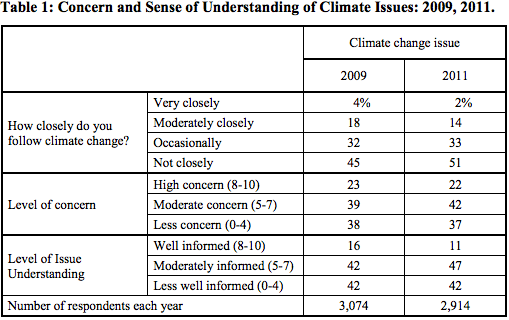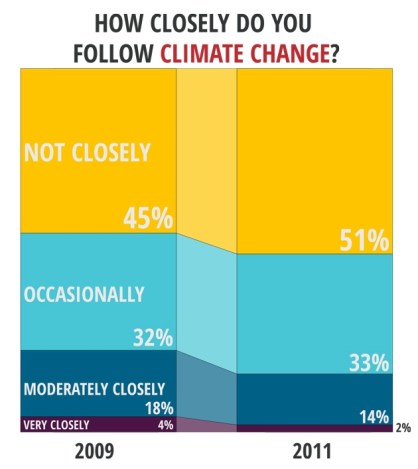 Members of Generation X are responding in a disturbing way to climate change — with a big, collective shrug of indifference. Grist readers being the obvious exceptions, of course.
Members of Generation X are responding in a disturbing way to climate change — with a big, collective shrug of indifference. Grist readers being the obvious exceptions, of course.
Only 22 percent expressed “high concern” about climate change in a 2011 survey [PDF] of about 3,000 Gen-Xers in their late 30s. This despite the fact that “Generation X is the most scientifically literate and best educated generation in American history,” according to lead researcher Jon D. Miller.
The data come from the Longitudinal Study of American Youth, a University of Michigan-led project that has exhaustively tracked the views on various subjects of thousands of Gen-Xers since they were pimply-faced students attending high school across 26 states in 1987.
Along with a lack of concern, the survey participants exhibited a growing lack of engagement: In 2009, just one out of every 25 said they followed climate change “very closely.” When the same question was asked of the same group last year, just one out of every 50 responded the same way.
Climate literacy also fell during that two-year period. In 2009, 16 percent said they were “well informed” on climate change issues. Two years later, that figure had fallen to 11 percent.
Miller, who’s taught classes on the politics of climate change and who directs the University of Michigan’s International Center for the Advancement of Scientific Literacy, said he was surprised by the latest survey results.
“I didn’t think it would ever be a huge majority of people that are attuned to this,” Miller said. “But I thought it would be a little better than it turned out to be.”
At least parents — the people whose children and grandchildren will inherit this battered planet — must be paying close attention. Right?
Ooh, more disappointing news for you: The latest survey results indicate that Generation Xers with children actually pay less attention to climate change news than other members of their generation.
Miller attributed that surprising finding to the heavy demands of parenting in modern America. “Somewhere between your two jobs and commuting back and forth and getting your kids to soccer and ballet and swimming and whatever else you’re doing with them, you have little time left to read about what’s happening in the world around you,” he said.
Miller said the complexity of climate change and global weather patterns, combined with contradictory messages broadcast by politicians, environmental groups, media outlets, and fossil-fuel companies, make it difficult for busy people to wrap their heads around the issues. “People have less time to read carefully about it. They’re trying to catch it on the fly — and climate change is not something that’s easy to catch on the fly,” he said.
David Herring, a science communicator in NOAA’s climate office, said mainstream media’s coverage of climate change confuses many people and causes them to tune the topic out of their minds. “There is a lot of information out there, but some of it is of mixed quality, if you will.” Too often, Herring said, journalists quote pundits criticizing the work of climate scientists in a failed bid to present a balanced story.
“I think it does have the effect of confusing people,” Herring said. “The person goes away confused saying, ‘Well, the scientists themselves are undecided, so why would I have an opinion on this?’ But that misrepresents the situation.”
Christian Chynoweth, a 40-year-old San Francisco resident who fears that his two children will grow up to face a topsy-turvy climate, said he is “totally into the environment” and “definitely concerned” about climate change. But, like those surveyed by Miller’s group, he said he just doesn’t “spend much time” thinking about it.
Chynoweth spoke sharply about what he described as sensationalism by American media, saying that “you’ve got to read through a lot of bullshit” to find actual, impartial news.
“I probably keep up on the stories about the ice packs and the glaciers melting,” Chynoweth said. “But I don’t really watch the news at all because I find it all so negative, and that kind of pushes me away from reading more.”
See survey data for yourself:

Image from “The Generation X Report: Climate Change” [PDF], by the Longitudinal Study of American Youth.





